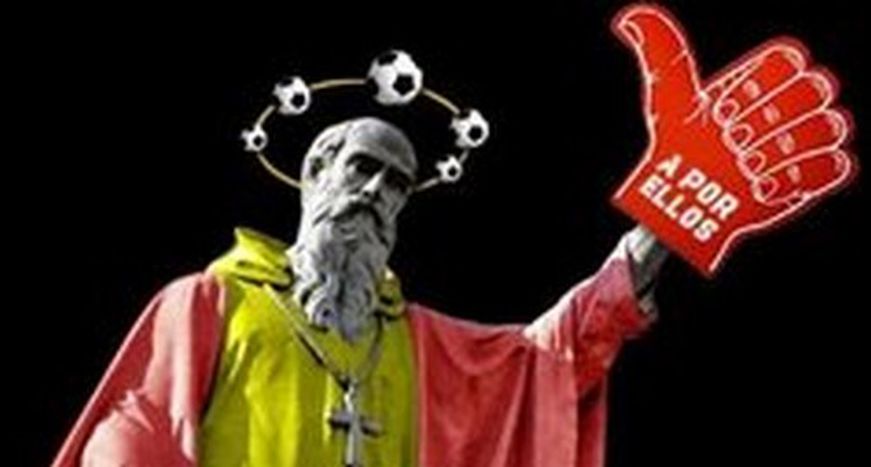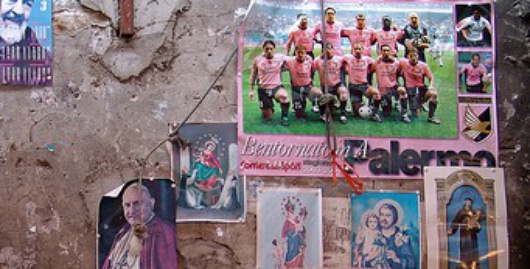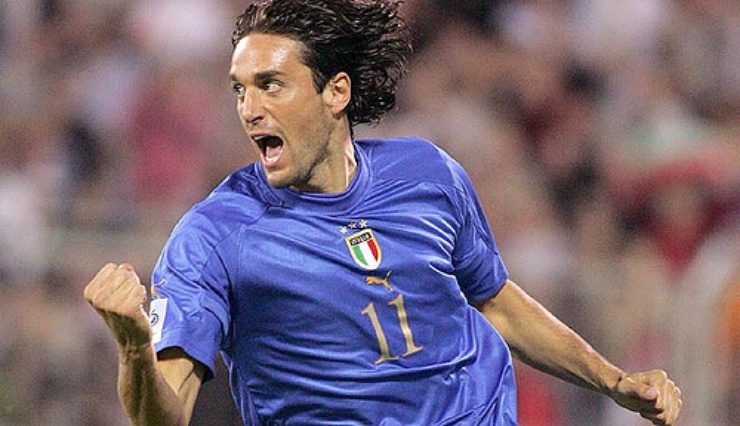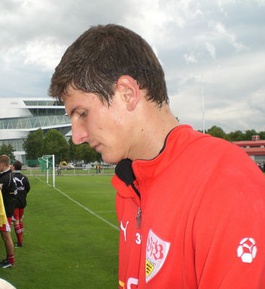
Superstition for the Euro 2008 final
Published on
Translation by:
 David Robinson
David Robinson
It’s only human to resort to the supranatural in a match, in the hope of gaining extra help from beyond. How effective can prayers and rituals be when Spain take on Germany on 29 June
Players frequently carry out small rituals before matches, in order to get the stars, destiny, the gods, (or any other supranatural entity that might give them a hand) on their side. The effectiveness of such practices, beyond science but as old as life itself, is more than debatable – especially taking into account the ‘good fortune’ of teams whose players are engaged in such practices.
 The host countries, Austria and Switzerland, cannot blame fate for their elimination in the first round of Euro 2008. From the beginning, it was well known that their chances (in sporting terms) were considerably lower than the rest. Nevertheless, they might still have had a stoke of good luck... Perhaps that was the thinking behind the church of Austria’s decision to appoint Father Christoph Pelczar the official chaplain for Euro 2008, and who acted as the spiritual guide for those footballers of the catholic faith. Polish footballers called upon him regularly in search of spiritual comfort, searching for the light at the end of the tunnel –above all following their elimination against the Germans.
The host countries, Austria and Switzerland, cannot blame fate for their elimination in the first round of Euro 2008. From the beginning, it was well known that their chances (in sporting terms) were considerably lower than the rest. Nevertheless, they might still have had a stoke of good luck... Perhaps that was the thinking behind the church of Austria’s decision to appoint Father Christoph Pelczar the official chaplain for Euro 2008, and who acted as the spiritual guide for those footballers of the catholic faith. Polish footballers called upon him regularly in search of spiritual comfort, searching for the light at the end of the tunnel –above all following their elimination against the Germans.
By all appearances, the Frenchman Franck Ribéry draws upon his beliefs to boost his strength before the match. Each time the ‘les bleus’ midfielder goes into a match, it is said that he prays to Allah – he converted to Islam in 2002. A custom that has not helped him too much, for he returns home injured with a sprained knee and with his team eliminated by Italy on 17 June. It is also frequent to see other players cross themselves before they go on the pitch, such as the German striker Miroslav Klose or the Croat Ivan Klasnic – who, football aside, is blessed with being the first leading player to participate in a big match following a kidney transplant.
Damn Friday 13th!
Well yes, the legend surrounding the day so hated by some (the day of bad luck across almost all of Europe) goes on; all those teams that played on that fateful date are already out of the competition, despite three of them entering as favorites. Romania (kicked out by the Dutch) and France left the competition in the first round, whilst Italy and Holland – two of the most promising teams – suffered defeat in the quarter finals.


Flirting with superstition did not deliver on expectations either for Luca Toni, the Italian striker of Bayern Munich. Given his bad luck in the previous rounds of the European cup, the man from Modena decided to grow a moustache, which, in theory should bring good luck and provide a fruitful string of goals. It was not to be. Toni went home after losing out in pentalties against Spain on 22 June, his goal tally at zero, and his face free of moustache – he promised to shave it off if he did not score against the Spanish.
Fortuitous fortune telling?
The French coach, Raymond Domenech, does not seem to have luck on his side given the disastrous performance of his team in Euro 2008. This despite (according to some) his great interest in the occult and astrology. It has been said that the coach selects his players according to the constellational alignment of their birth dates, and taking into account the date of the match. Nevertheless, he denies this because, as he commented to journalists in a press conference, ‘superstitions bring bad luck.’
Those that tried to see into the future have not really got it right either. 30% of the Dutch believed that their team would be the one to lift the European nations cup, perhaps spurred on by the good performances they put in the first matches. The living legend of Portuguese football, Eusebio, was perhaps more accurate when he stated, following the success of the ‘selecção’ against the Czech Republic, that ‘Portugal can now dream of the title of champions of Europe.’ A dream is but a dream... Perhaps the most striking misguided prediction was that of French claivoyant Elizabeth Teissier who, on her webpage, assured readers that ‘les bleus’ would, at a minimum, reach the semi-finals –this two days after their elimination. Spot on!
'Saint quarter finals'
Things went a lot better for the Spanish who, at last, managed to break the psychological barrier of the quarter finals, and got through the semi-finals smoothly with a 3-0 win over Russia. Perhaps the imaginary comedy ‘San Cuartos’ (‘Saint Quarter Finals’), which received almost 40, 000 candles from Spanish fans, gave the team the necessary push. It seems that it worked. Spanish coach Luis Aragonés also has his little ways, and is slightly concerned about the colour of the shirt that the team will wear against Russia – gold (almost, almost yellow –the colour of bad luck in Spain).
 Amongst the Germans, as far as superstitions go, Mario Gómez stands out for being the only player that will not sing the German anthem before each match. This is not because of his Spanish roots, but rather because of a superstition that goes back to when he was a member of the German fifteen: as he has stated, he scored a goal in a match when he had not sung the ‘Deutschlandlied’. He has continued with the tradition ever since. urthermore, before each match, he always uses the urinal situated furthest to the left.
Amongst the Germans, as far as superstitions go, Mario Gómez stands out for being the only player that will not sing the German anthem before each match. This is not because of his Spanish roots, but rather because of a superstition that goes back to when he was a member of the German fifteen: as he has stated, he scored a goal in a match when he had not sung the ‘Deutschlandlied’. He has continued with the tradition ever since. urthermore, before each match, he always uses the urinal situated furthest to the left.
Whether they work or not, we will soon know who has won. Perhaps we should go to the special mass held in the cathedral of Saint Stephen in Vienna to bring the supernatural powers on to our side. In all cases, may the best team win in the final on 29 June –whether on their own merit or by fate!
Translated from Euro2008: “Ser supersticioso trae mala suerte”


